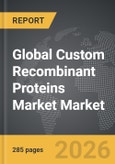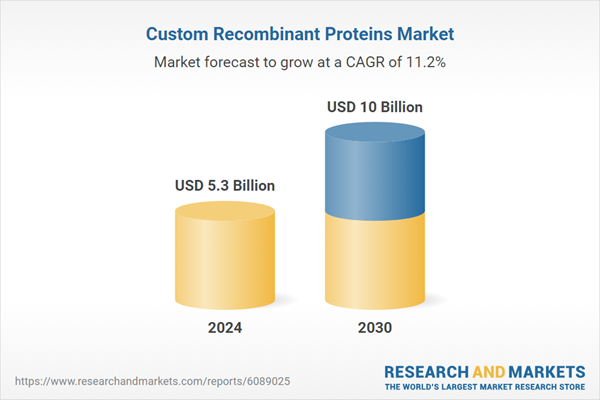Global Custom Recombinant Proteins Market - Key Trends & Drivers Summarized
Why Are Custom Recombinant Proteins Becoming Essential in Biomedical Research and Therapeutic Development?
Custom recombinant proteins are increasingly becoming the backbone of modern biomedical research and drug development due to their unparalleled specificity, consistency, and flexibility in experimental design. Unlike native proteins extracted from biological tissues, recombinant proteins are produced via genetically engineered organisms - most commonly bacteria, yeast, insect, or mammalian cells - designed to express target proteins in high purity and yield. This method allows scientists to tailor protein sequences, add tags, or introduce mutations, offering a level of customization that is vital for studying protein function, receptor interactions, and enzyme mechanisms. In drug discovery, custom proteins serve as antigens in antibody development, targets for high-throughput screening, and structural models in crystallography and cryo-electron microscopy. Their consistent quality and reproducibility make them ideal for diagnostic kit manufacturing and vaccine formulation, where precision is non-negotiable. Moreover, the growing complexity of biotherapeutics - such as bispecific antibodies, fusion proteins, and engineered enzymes - has necessitated the creation of custom proteins that meet exact structural and functional criteria. The increasing adoption of proteomics and precision medicine further underscores the need for highly specific protein tools tailored to disease biomarkers or individual genetic profiles. As a result, custom recombinant proteins are no longer viewed as mere reagents but as central enablers of innovation across life sciences, diagnostics, and biopharmaceutical pipelines.How Are Technological Innovations Enhancing the Design, Production, and Purification of Custom Recombinant Proteins?
The custom recombinant proteins market is being reshaped by technological advancements that have dramatically improved the speed, accuracy, and scalability of protein expression, engineering, and purification. One of the most impactful developments is the use of CRISPR and other genome editing tools to optimize host cell lines, enabling more efficient gene integration and expression. Expression systems themselves have diversified, with mammalian cells favored for complex post-translational modifications, while bacterial and yeast systems remain essential for rapid and cost-effective protein production. Advanced vectors and promoters now allow for tightly regulated expression and higher yields, reducing time to market for research and therapeutic proteins. Innovations in codon optimization, signal peptide design, and folding chaperones have enhanced protein solubility and functionality. On the purification front, affinity chromatography, automated liquid handling systems, and high-resolution mass spectrometry are ensuring high purity levels and structural integrity, even in difficult-to-express proteins. Moreover, AI-driven protein design platforms are now being used to predict stability, immunogenicity, and activity, allowing for more intelligent engineering of protein variants before synthesis even begins. Companies are also investing in end-to-end automation and cloud-based platforms that allow researchers to submit gene sequences and receive purified custom proteins in just weeks. These technological improvements are accelerating the pace of biological discovery and therapeutic innovation, making custom recombinant protein services more reliable, accessible, and indispensable.What Industry and Research Trends Are Driving the Increasing Demand for Custom Recombinant Proteins?
The demand for custom recombinant proteins is being propelled by a host of industry and research trends that span pharmaceutical development, diagnostics, agriculture, and academic science. In the pharmaceutical sector, the rise of biologics and biosimilars has dramatically increased the need for customized proteins for use in cell-based assays, toxicity testing, and formulation development. As immunotherapy and targeted therapies gain ground, pharmaceutical companies are requesting custom cytokines, growth factors, and checkpoint proteins that mimic human physiology more accurately than off-the-shelf alternatives. In diagnostics, the push for precision medicine has led to the creation of recombinant proteins that serve as specific biomarkers or detection targets in immunoassays and ELISAs. Research institutions are also investing more in structural and functional proteomics, driving demand for engineered proteins with site-specific modifications, fluorescent tags, or mutation panels. Agricultural biotechnology is another emerging market, where custom proteins are used to study plant immunity, develop disease-resistant crops, and engineer enzyme-based fertilizers. Educational labs and CROs are adopting recombinant protein services to reduce turnaround times and maintain experimental rigor. Furthermore, the COVID-19 pandemic spotlighted the importance of recombinant proteins in rapid vaccine development, antibody testing, and therapeutic screening - accelerating their global visibility and perceived value. These broad-based applications underscore the centrality of custom proteins in fueling discovery, innovation, and product development across both established and emerging scientific fields.What Are the Key Drivers Fueling Growth in the Global Custom Recombinant Proteins Market?
The global custom recombinant proteins market is experiencing robust growth driven by converging forces such as rising R&D investments, increasing prevalence of chronic and genetic diseases, and the accelerating shift toward personalized medicine. A primary growth driver is the expansion of biopharmaceutical pipelines, where tailored proteins are required for every stage from early discovery to clinical validation. The global surge in biologics - including monoclonal antibodies, vaccines, and gene therapies - necessitates the consistent supply of customized proteins for efficacy testing and regulatory compliance. Additionally, government and private sector funding for life sciences research has reached historic levels, particularly in genomics, oncology, and infectious disease studies, creating a fertile ground for protein customization services. The growing number of academic-industry collaborations and contract research organizations (CROs) seeking quick, reliable access to unique protein constructs further expands the customer base. Emerging economies are also ramping up their biotechnology capabilities, increasing demand for localized, customizable protein production services. Regulatory agencies like the FDA and EMA now emphasize rigorous validation of biologics, increasing the need for high-quality, traceable protein reagents. As more researchers pursue complex, multi-domain, and fusion proteins that cannot be sourced off-the-shelf, the appeal of bespoke recombinant solutions continues to rise. Coupled with technological scalability and improvements in delivery timelines, these drivers are ensuring the long-term viability and growth of the global custom recombinant proteins market.Report Scope
The report analyzes the Custom Recombinant Proteins market, presented in terms of market value (US$). The analysis covers the key segments and geographic regions outlined below:- Segments: Expression System (Mammalian, Bacteria, Insect, Yeast, Other Expression Systems); End-User (Research Institutes, Pharma & Biotech Companies, Contract Research Organizations, Other End-Users).
- Geographic Regions/Countries: World; United States; Canada; Japan; China; Europe (France; Germany; Italy; United Kingdom; Spain; Russia; and Rest of Europe); Asia-Pacific (Australia; India; South Korea; and Rest of Asia-Pacific); Latin America (Argentina; Brazil; Mexico; and Rest of Latin America); Middle East (Iran; Israel; Saudi Arabia; United Arab Emirates; and Rest of Middle East); and Africa.
Key Insights:
- Market Growth: Understand the significant growth trajectory of the Mammalian Expression segment, which is expected to reach US$4.4 Billion by 2030 with a CAGR of a 12.8%. The Bacteria Expression segment is also set to grow at 8.4% CAGR over the analysis period.
- Regional Analysis: Gain insights into the U.S. market, valued at $1.4 Billion in 2024, and China, forecasted to grow at an impressive 15.5% CAGR to reach $2.1 Billion by 2030. Discover growth trends in other key regions, including Japan, Canada, Germany, and the Asia-Pacific.
Why You Should Buy This Report:
- Detailed Market Analysis: Access a thorough analysis of the Global Custom Recombinant Proteins Market, covering all major geographic regions and market segments.
- Competitive Insights: Get an overview of the competitive landscape, including the market presence of major players across different geographies.
- Future Trends and Drivers: Understand the key trends and drivers shaping the future of the Global Custom Recombinant Proteins Market.
- Actionable Insights: Benefit from actionable insights that can help you identify new revenue opportunities and make strategic business decisions.
Key Questions Answered:
- How is the Global Custom Recombinant Proteins Market expected to evolve by 2030?
- What are the main drivers and restraints affecting the market?
- Which market segments will grow the most over the forecast period?
- How will market shares for different regions and segments change by 2030?
- Who are the leading players in the market, and what are their prospects?
Report Features:
- Comprehensive Market Data: Independent analysis of annual sales and market forecasts in US$ Million from 2024 to 2030.
- In-Depth Regional Analysis: Detailed insights into key markets, including the U.S., China, Japan, Canada, Europe, Asia-Pacific, Latin America, Middle East, and Africa.
- Company Profiles: Coverage of players such as ACS Custom, Cotral, Crystal Guardian, Decibullz, Dynamic Ear Company and more.
- Complimentary Updates: Receive free report updates for one year to keep you informed of the latest market developments.
Some of the 39 companies featured in this Custom Recombinant Proteins market report include:
- Abcam plc
- Abnova Corporation
- ACROBiosystems
- Aviva Systems Biology
- Bio-Rad Laboratories, Inc.
- Bio-Techne Corporation
- BPS Bioscience, Inc.
- CER Groupe
- Creative BioMart
- Enzo Biochem Inc.
- Eurogentec
- GenScript Biotech Corporation
- Merck KGaA
- Miltenyi Biotec
- Novoprotein Scientific Inc.
- ProSpec-Tany TechnoGene Ltd.
- Proteintech Group, Inc.
- RD-Biotech
- Sino Biological Inc.
- Thermo Fisher Scientific Inc.
This edition integrates the latest global trade and economic shifts into comprehensive market analysis. Key updates include:
- Tariff and Trade Impact: Insights into global tariff negotiations across 180+ countries, with analysis of supply chain turbulence, sourcing disruptions, and geographic realignment. Special focus on 2025 as a pivotal year for trade tensions, including updated perspectives on the Trump-era tariffs.
- Adjusted Forecasts and Analytics: Revised global and regional market forecasts through 2030, incorporating tariff effects, economic uncertainty, and structural changes in globalization. Includes historical analysis from 2015 to 2023.
- Strategic Market Dynamics: Evaluation of revised market prospects, regional outlooks, and key economic indicators such as population and urbanization trends.
- Innovation & Technology Trends: Latest developments in product and process innovation, emerging technologies, and key industry drivers shaping the competitive landscape.
- Competitive Intelligence: Updated global market share estimates for 2025, competitive positioning of major players (Strong/Active/Niche/Trivial), and refined focus on leading global brands and core players.
- Expert Insight & Commentary: Strategic analysis from economists, trade experts, and domain specialists to contextualize market shifts and identify emerging opportunities.
Table of Contents
Companies Mentioned (Partial List)
A selection of companies mentioned in this report includes, but is not limited to:
- Abcam plc
- Abnova Corporation
- ACROBiosystems
- Aviva Systems Biology
- Bio-Rad Laboratories, Inc.
- Bio-Techne Corporation
- BPS Bioscience, Inc.
- CER Groupe
- Creative BioMart
- Enzo Biochem Inc.
- Eurogentec
- GenScript Biotech Corporation
- Merck KGaA
- Miltenyi Biotec
- Novoprotein Scientific Inc.
- ProSpec-Tany TechnoGene Ltd.
- Proteintech Group, Inc.
- RD-Biotech
- Sino Biological Inc.
- Thermo Fisher Scientific Inc.
Table Information
| Report Attribute | Details |
|---|---|
| No. of Pages | 285 |
| Published | January 2026 |
| Forecast Period | 2024 - 2030 |
| Estimated Market Value ( USD | $ 5.3 Billion |
| Forecasted Market Value ( USD | $ 10 Billion |
| Compound Annual Growth Rate | 11.2% |
| Regions Covered | Global |









